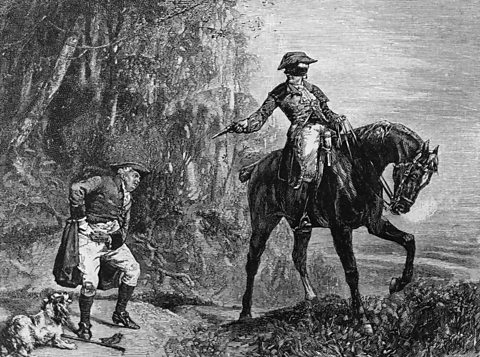Highway robbery and smuggling
As Britain grew richer in the 18th century, there were increased opportunities for crime. Travellers were at increased risk of being victims of highway highway robberyUsing force or the threat of force to steal money or property from travellers on the roads. while smugglingMoving goods illegally from one place to another. became a very lucrative way of making money.
Highway robbery
During the Industrial RevolutionThe process that transformed manufacturing from handmade to machine-made, mass-produced goods using water, steam and coal power transported by canal, rail and steamship. Britain was the first country to have an Industrial Revolution. foreign trade increased. Many of the goods produced in British factories were exported abroad.

Transport improved through the introduction of turnpike roads, canals and the development of the railways. These new forms of transport led to some new opportunities for crime, such as highway robbery.
Highway robbery was a growing crime in the 18th century, for various reasons:
- There were more roads and more people travelling than in earlier centuries.
- Many of the roads went through open, isolated areas, where it was easy to rob people and then get away.
- After the end of the Napoleonic Wars, a lot of ex-soldiers struggled to find work and so turned to highway robbery.
- Taverns and inns were dotted along the roads as places for travellers to stay. These gave highway robbers opportunities to hide or sell their loot.
- Horses were cheap to buy and guns were easy to get hold of thanks to the industrial and agricultural changes.
- The Industrial Revolution had led to many merchants becoming rich. Often, they would carry a lot of valuables on the roads as there were few banks at the time.
Smuggling
Smuggling is the illegal trade in goods to avoid paying customs duties and taxes. Merchants and traders had to pay:
- excise duty - a tax on goods made and consumed in a country (it was placed on tea, beer, cider, salt, leather and soap)
- customs duty - a tax on imported and exported goods
Excise and customs duties were high in the 18th century. This was because the government was trying to raise money to pay for a war with France.

Smuggling grew during the 18th century for various reasons:
- Taxes and duties were increasing.
- People who smuggled goods into the country could make a large profit on the black marketA black market is when goods or services are traded illegally.
- Smuggled goods were popular as they were usually cheaper than legally imported goods. People did not tend to see smuggling as a serious crime. Some local people supported smuggling.
- There are thousands of miles of coastline in Britain, and most of it was unguarded and poorly policed.
- Smuggling was often perceived as an exciting activity and was a quick way to make money.
- Many people invested money in setting up smuggling gangs.
- Tea was commonly smuggled into the country in the 18th century. Wine, spirits and lace were also often smuggled.